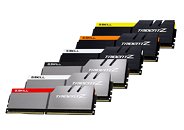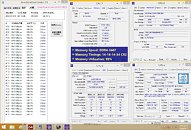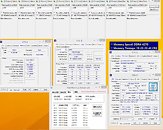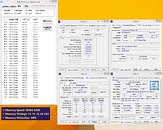- Joined
- Oct 9, 2007
- Messages
- 47,241 (7.55/day)
- Location
- Hyderabad, India
| System Name | RBMK-1000 |
|---|---|
| Processor | AMD Ryzen 7 5700G |
| Motherboard | ASUS ROG Strix B450-E Gaming |
| Cooling | DeepCool Gammax L240 V2 |
| Memory | 2x 8GB G.Skill Sniper X |
| Video Card(s) | Palit GeForce RTX 2080 SUPER GameRock |
| Storage | Western Digital Black NVMe 512GB |
| Display(s) | BenQ 1440p 60 Hz 27-inch |
| Case | Corsair Carbide 100R |
| Audio Device(s) | ASUS SupremeFX S1220A |
| Power Supply | Cooler Master MWE Gold 650W |
| Mouse | ASUS ROG Strix Impact |
| Keyboard | Gamdias Hermes E2 |
| Software | Windows 11 Pro |
G.SKILL International Enterprise Co., Ltd., the world's leading manufacturer of extreme performance memory and gaming peripherals, is thrilled to announce a new series of high performance DDR4 kits based on 8GB & 16GB modules, from ultra low CAS Latency DDR4 3200MHz CL13 and DDR4 3466MHz CL14 to an extreme speed of DDR4 4266MHz CL19. All these new extreme performance memory are built with ultra high performance Samsung DDR4 8Gb ICs and will join G.SKILL flagship Trident Z series family.
G.SKILL is excited to continuously push the performance of DDR4 technology to the boundaries. These newly released memory kits provide PC enthusiasts, extreme gamers, and overclockers ultimate memory speed, as well as ultra high density for professional applications.




These new ultimate Trident Z memory will be available via G.SKILL authorized distribution partners in June 2016. For detail specifications, please refer to the following chart:

XMP 2.0 Support for 6th Gen Intel Core Processors & Z170 Platforms
These new high performance Trident Z kits are designed for the latest 6th Gen Intel Core processors and Z170 chipset platforms with the latest XMP 2.0 profile. The stress-testing screenshots of the memory kits can be found below. The 4266MHz kit was validated with the ASUS ROG MAXIMUS VIII IMPACT motherboard, while the 3200 CL13 and 3466 CL14 kits were validated with the ASUS Z170-DELUXE motherboard.
View at TechPowerUp Main Site
G.SKILL is excited to continuously push the performance of DDR4 technology to the boundaries. These newly released memory kits provide PC enthusiasts, extreme gamers, and overclockers ultimate memory speed, as well as ultra high density for professional applications.




These new ultimate Trident Z memory will be available via G.SKILL authorized distribution partners in June 2016. For detail specifications, please refer to the following chart:

XMP 2.0 Support for 6th Gen Intel Core Processors & Z170 Platforms
These new high performance Trident Z kits are designed for the latest 6th Gen Intel Core processors and Z170 chipset platforms with the latest XMP 2.0 profile. The stress-testing screenshots of the memory kits can be found below. The 4266MHz kit was validated with the ASUS ROG MAXIMUS VIII IMPACT motherboard, while the 3200 CL13 and 3466 CL14 kits were validated with the ASUS Z170-DELUXE motherboard.
View at TechPowerUp Main Site


